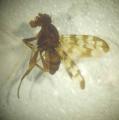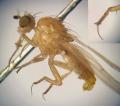Diptera.info :: Identification queries :: Diptera (adults)
|
Tabanidae, Chrysops laniger Male
|
|
| jonrichfield |
Posted on 14-02-2015 15:21
|
|
Member Location: Somerset West South Africa Posts: 87 Joined: 04.09.14 |
A friend posted these two shots of what I am fairly certain is one of the Tabanidae, having first wondered, then accepted as such on the basis of its venation. However, I post the shots because I have never seen the like. Any ideas of genera, biology etc anyone? If not, just enjoy; Pieter Kotzee takes some fine photos. First Photo 1. jonrichfield attached the following image: 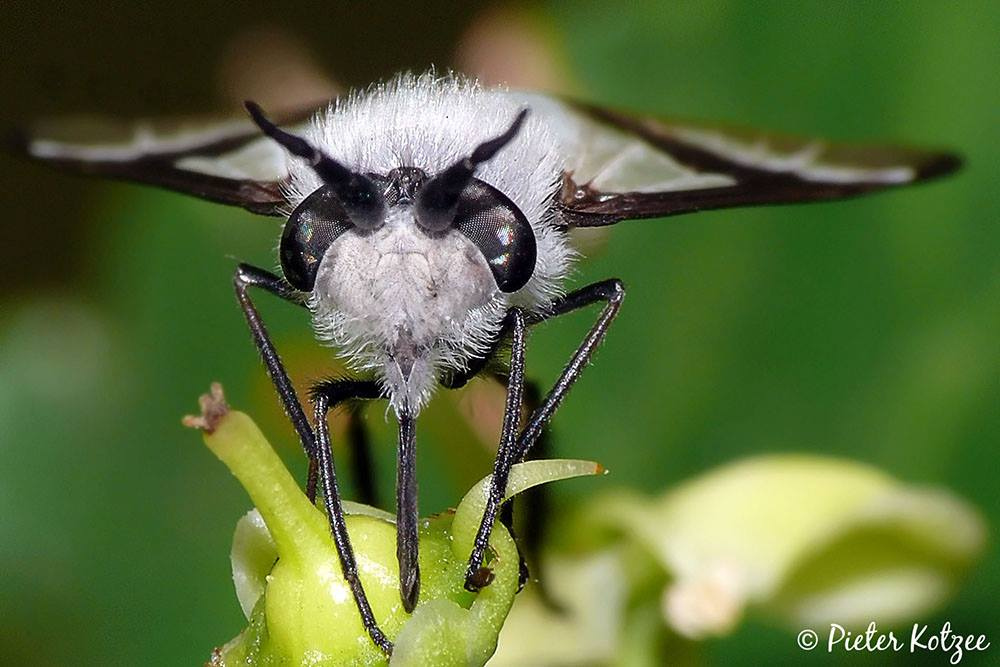 [164.47Kb] Edited by jonrichfield on 28-02-2015 16:33 |
|
|
|
| jonrichfield |
Posted on 14-02-2015 15:29
|
|
Member Location: Somerset West South Africa Posts: 87 Joined: 04.09.14 |
OK, Lateral aspect coming up, venation should be discernible (with difficulty).
jonrichfield attached the following image: 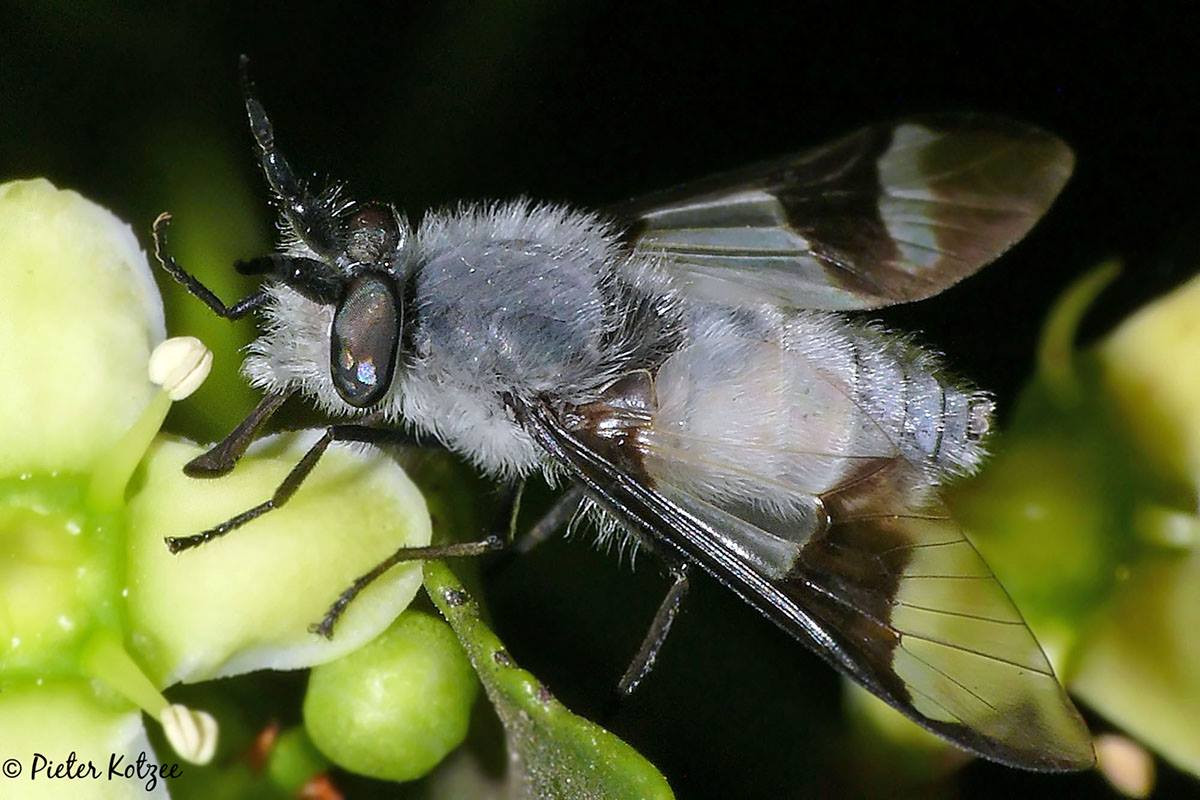 [166.76Kb] Edited by jonrichfield on 14-02-2015 15:30 |
|
|
|
| jonrichfield |
Posted on 14-02-2015 15:40
|
|
Member Location: Somerset West South Africa Posts: 87 Joined: 04.09.14 |
Apologies all: I got so involved in the uploading that I forgot to mention the location: Heidelberg, Gauteng, South Africa. Google Earth Coords roughly -26.49, 28.4 |
|
|
|
| Zeegers |
Posted on 14-02-2015 16:42
|
|
Member Location: Soest, NL Posts: 19293 Joined: 21.07.04 |
STUNNING ! No idea, never seen. Should be some Chrysops. Any chance we can see the antenna in focus ? Theo |
|
|
|
| sd |
Posted on 14-02-2015 18:32
|
|
Member Location: Suffolk, UK Posts: 893 Joined: 11.10.07 |
Hi, I think this is Chrysops laniger, the males of this group have long pale hairs unlike the more typical females. Steve |
|
|
|
| jonrichfield |
Posted on 14-02-2015 18:41
|
|
Member Location: Somerset West South Africa Posts: 87 Joined: 04.09.14 |
Zeegers wrote: STUNNING ! No idea, never seen. Should be some Chrysops. Any chance we can see the antenna in focus ? Theo I doubt it Theo, but I'll pass this remark on to Pieter. Maybe there will be more in his area from time to time. |
|
|
|
| jonrichfield |
Posted on 14-02-2015 18:50
|
|
Member Location: Somerset West South Africa Posts: 87 Joined: 04.09.14 |
sd wrote: Hi, I think this is Chrysops laniger, the males of this group have long pale hairs unlike the more typical females. Steve Thank you Steve, I'll pass that on to Pieter. The specific epithet laniger (which I believe means "woolly" ) seems apposite.  |
|
|
|
| jonrichfield |
Posted on 14-02-2015 18:57
|
|
Member Location: Somerset West South Africa Posts: 87 Joined: 04.09.14 |
BTW, I notice that the eyes are typically masculine, with large ommatidia above and fine ommatidia below. Also, the proboscis would seem better adapted to sopping up nectar than piercing for blood (granting that I cannot see what any internal stylets might look like.)  |
|
|
|
| Zeegers |
Posted on 14-02-2015 19:06
|
|
Member Location: Soest, NL Posts: 19293 Joined: 21.07.04 |
It IS a male, if you are in doubt. Many Chnysops males have the eyes dichoptic. Theo |
|
|
|
| jonrichfield |
Posted on 14-02-2015 19:53
|
|
Member Location: Somerset West South Africa Posts: 87 Joined: 04.09.14 |
Thanks Theo, that was what I had deduced, but it is prudent to confirm one's suspicions. Incidentally, such dichoptism, particularly among males seems to be very widespread in certain insects, generally males of flying insects, and in particular in many Diptera, though also in unrelated orders. I don't suppose that anyone in the forum happens to know of any reason why? I have a private speculation, but I'd rather not mention it before hearing what others have to say, for fear of influencing any discussion. |
|
|
|
| John Carr |
Posted on 14-02-2015 20:55
|
|
Super Administrator Location: Colorado, USA Posts: 10623 Joined: 22.10.10 |
Dichoptic Chrysops males can be sexed by the inner margins of the eyes. They are closely spaced and the frons is narrowest in front of the ocelli. Females have broad, nearly parallel-sided frons. |
| sd |
Posted on 14-02-2015 22:50
|
|
Member Location: Suffolk, UK Posts: 893 Joined: 11.10.07 |
Hi Jon, in Tabanidae the male/female proboscis is essentially the same. Stylets in the female mouth parts stab the skin and blood is lapped from the surface - like nectar! Very different method to mosquitoes. C laniger is indeed a suitable name  regards, Steve |
|
|
|
| jonrichfield |
Posted on 15-02-2015 11:55
|
|
Member Location: Somerset West South Africa Posts: 87 Joined: 04.09.14 |
Thanks chaps, you really are being very helpful as usual. Possibly by way of reward, Pieter has presented another useful image, showing the antennae in better detail as Theo requested. I attach it. Incidentally it also shows the proboscis from a more helpful angle, consistently with Steve's remarks. John, thanks, and your description of the eyes of the male Chrysops of course matches the full-face image very well. jonrichfield attached the following image: 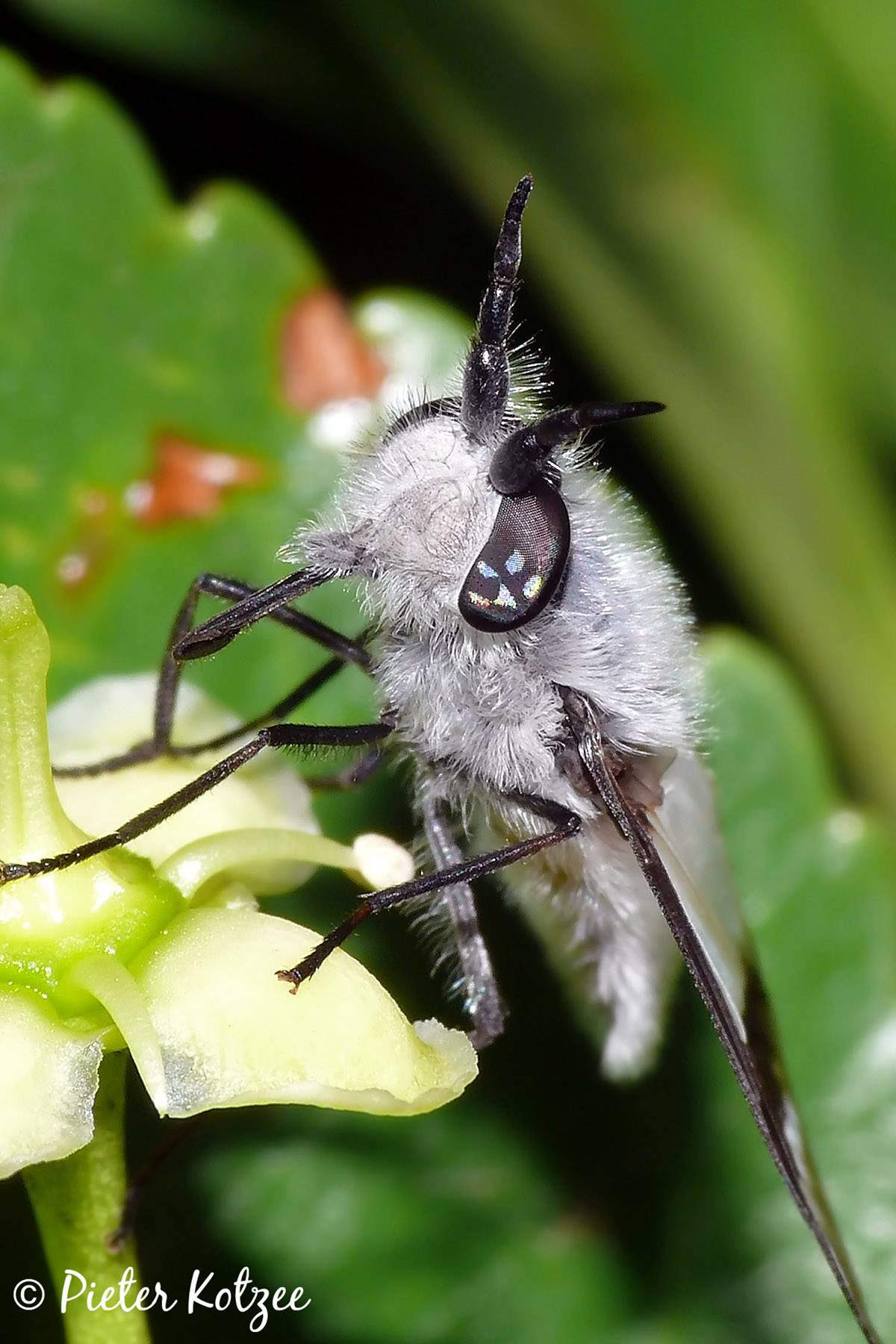 [190.3Kb] |
|
|
|
| Tony T |
Posted on 15-02-2015 14:01
|
|
Member Location: New Brunswick, Canada Posts: 664 Joined: 08.02.07 |
Description and images of this species, laniger, in Oldroyd "The Horse Flies of the Ethiopian Region" vol III. pp 88-93 |
|
|
|
| Zeegers |
Posted on 15-02-2015 15:03
|
|
Member Location: Soest, NL Posts: 19293 Joined: 21.07.04 |
Yes, I had finally time to grab the book and the ID is 1000 % correct ! Theo |
|
|
|
| jonrichfield |
Posted on 15-02-2015 17:29
|
|
Member Location: Somerset West South Africa Posts: 87 Joined: 04.09.14 |
Much thanks everyone! |
|
|
|
| Jump to Forum: |


